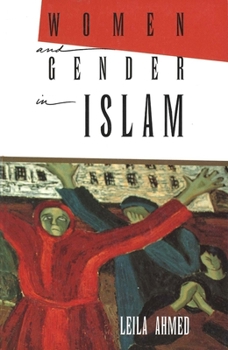Women and Gender in Islam: Historical Roots of a Modern Debate
Select Format
Select Condition 
Book Overview
"Destined to become a classic. . . . It gives Muslim women] back our rightful place, at the center of our histories."--Rana Kabbani, The Guardian " O]ne of the best studies of Islam's discourse on gender."--Hans Kundnani, Wall Street Journal "This book stands out as particularly original, insightful and sensitive."--Foreign Affairs Are Islamic societies inherently oppressive to women? Is the trend among Islamic women to appear once again in veils and other traditional clothing a symbol of regression or an effort to return to a "pure" Islam that was just and fair to both sexes? In this book Leila Ahmed adds a new perspective to the current debate about women and Islam by exploring its historical roots, tracing the developments in Islamic discourses on women and gender from the ancient world to the present. In order to distinguish what was distinctive about the earliest Islamic doctrine on women, Ahmed first describes the gender systems in place in the Middle East before the rise of Islam. She then focuses on those Arab societies that played a key role in elaborating the dominant Islamic discourses about women and gender: Arabia during the period in which Islam was founded; Iraq during the classical age, when the prescriptive core of legal and religious discourse on women was formulated; and Egypt during the nineteenth and twentieth centuries, when exposure to Western societies led to dramatic social change and to the emergence of new discourses on women. Throughout, Ahmed not only considers the Islamic texts in which central ideologies about women and gender developed or were debated but also places this discourse in its social and historical context. Her book is thus a fascinating survey of Islamic debates and ideologies about women and the historical circumstances of their position in society, the first such discussion using the analytic tools of contemporary gender studies.
Format:Paperback
Language:English
ISBN:0300055838
ISBN13:9780300055832
Release Date:July 1993
Publisher:Yale University Press
Length:304 Pages
Weight:1.03 lbs.
Dimensions:0.8" x 6.0" x 9.2"
Customer Reviews
3 ratings
Brilliant and informative.
Published by Thriftbooks.com User , 23 years ago
Leila Ahmed gives a brilliant and informative read about the history of women in Islam. Her book maintains both factual information along with anecdotal pieces which only enhance our understanding of the lives involved in the religion and politics of Islamic civilisations. While the book focuses on Egypt, it should be understand that Egypt is taken as a very typical regime with the exception of perhaps Morocco and Saudi Arabia as polar extremes. Ahmed clearly has a humanistic objective of equality in all her points, though never too harshly. The book carries a very clear picture of issues and can even help a lot of us consider what Western false concepts of female equality we truly have.
A serious work with no apologies for her feminism
Published by Thriftbooks.com User , 23 years ago
This book was assigned reading in my NYU course about the Middle East. Written by Leila Ahmed, a professor of Near Eastern studies at the University of Massachusetts at Amherst and the Director of the Women's Studies program there, it reinforced some basic information we studied from other textbooks, with a particular emphasis on women's role in Middle Eastern history. The book is well researched, with little-known documentation from pre-Islamic history on up to the present, citing what is known of ancient marriage laws and including literary writings and histories of some 19th and 20th Century women writers. Her particular feminist position is apparent throughout and there are no apologies for this. Often she writes about the veil and blames colonialism for using it as a misunderstood interpretation of women's subjugation.The second half of her book concentrates specifically on Egypt and it was fascinating. However, I would have liked to see more about the other countries, especially as she got into modern times. I also would have enjoyed reading her insights about the changes and challenges occurring today. It is refreshing to see a serious work such as this written by an Islamic woman and I hope she continues bringing her skills in research and interpretation to the public. Recommended.
A Must-Read for Anyone Interested in Women in Islam
Published by Thriftbooks.com User , 25 years ago
Leila Ahmed's WOMEN AND GENDER IN ISLAM is a wonderfully iconoclastic history of ideas about Muslim women. Cheerfully debunking every stereotype American readers have about women in the Islamic heartland, Ahmed weaves together theological and literary sources, statistics and travelers' tales, to create a narrative far more complex and even-handed than any other I have read on the topic. Her focus is on the development of ideas rather than the physical details of women's lives, yet many individual women sparkle in her tale. Whether she is identifying the cultural influences which led early Islam toward misogyny and away from egalitarianism (elements of both misogyny and egalitarianism existing in Arab society and thought at the time) or showing how Muslim modernizers were influenced by colonial European racism (which used a pseudo-feminism to denigrate traditional non-Western cultures), her writing is sophisticated and graceful. Never heavy or dogmatic, careful to limit her conclusions and generalizations, Ahmed's integrity is matched only by her feminism. She would be the first to suggest how much more work needs to be done in the study of Muslim women, but WOMEN AND GENDER IN ISLAM is a marvelous beginning.






